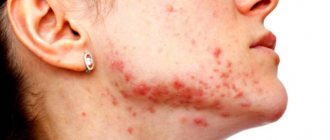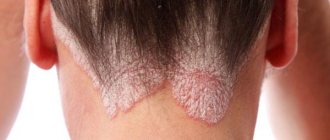Diseases caused by the herpes virus
Herpes has many types that cause various diseases:
(everyone takes it for a common cold) - belongs to the category 1–2 types. It is also called the herpes simplex virus.
Herpes on the lip- Genital herpes is also a type 1-2 virus.
- Chickenpox (varicella) is a type 3 herpes.
- Infectious mononucleosis is a known disease belonging to type 4.
- Cytomegalovirus infection is also caused by common herpes.
- Sudden exanthema is a virus common in children. Belongs to type 6 – 7. With this disease, the temperature rises to 38 degrees or higher and lasts for 3-4 days. Then skin rashes appear.
- Shingles (herpes) is also caused by the common herpes virus. Also called the Zoster virus.
What do all these types of diseases have in common? The bottom line is that they all have the same beginning - ordinary viral herpes.
Features of treatment in children under one year of age
When the first signs of infection appear in your baby, you should consult a specialist. For mild cases of the disease, treatment can be done at home.
However, if the illness is severe, the baby is hospitalized. The infection is serious and significantly reduces the child’s immunity. Self-medication is extremely dangerous.
Drug therapy
Conservative therapy for herpes is aimed at eliminating the source of infection, reducing discomfort, accelerating the healing of ulcers and reducing the intensity of associated symptoms. The treatment regimen is determined depending on the severity of the disease. The duration of therapy reaches 10-30 days. The table describes the main drugs that are used in the treatment of children.
| A drug | Release form | Action | Directions for use and dosage |
| Acyclovir | injection | antiviral | 5 mg per 1 kg of weight intravenously 3 times a day every 8 hours |
| ointment | apply to affected areas 5 times a day | ||
| Zovirax | smear the affected areas 4 times a day | ||
| Paracetamol | syrup | antipyretic | depending on body weight – up to 4 times a day |
| Ibuprofen | |||
| Pentoxyl | pills | immunomodulatory | daily dose – 15 mg |
| Lysozyme | powder for preparing suspension | antibacterial, immunostimulating | used as a solution for applications |
| Viferon | candles | increasing the body's resistance to the virus | 1 suppository 2 times a day |
| Suprastin | drops | antihistamine, reduces itching | individually |
| Immunal | immunity adjustment | individually | |
| Interferon | candles | antiviral, immunostimulating | 1 piece each 2 times a day |
| Fukortsin, brilliant green | solution | antiseptic, dries wounds | smear the surface next to the opened vial |
| Actovegin | injection | improvement of cerebral circulation | individually |
It is necessary to treat the baby comprehensively. The use of antiviral and immunomodulatory drugs helps overcome the infection. Antihistamines and ointments reduce itching, antipyretics ease the baby’s general condition. For severe forms of infection, immunoglobulins are used.
Folk remedies
Folk remedies cannot have a significant effect on the herpes virus. Their use reduces discomfort and speeds up the body's recovery. Traditional methods of treatment should be used with caution, since some substances can cause allergies in the baby. When treating herpes, the following traditional medicine recipes are used:
- Lotions from celandine juice. Freshly cut clean stems of the plant are applied with the cut site to the affected areas of the skin for 3 minutes 2 times a day.
- Potato compresses. A small potato is peeled and grated on a fine grater. The pulp is wrapped in gauze and applied to the affected area.
- Ointment made from honey and mustard. 1 tbsp. honey mixed with 1 tsp. mustard, lubricate damaged areas.
- Apply sea buckthorn oil to the rash.
- When the first signs of herpes appear, apply toothpaste to the red spots.
- Compresses from calendula infusion. 1 tsp flowers, pour 100 ml of boiling water, leave for 1 hour. Moisten a cotton swab and apply it to wounds and ulcers.
At the initial stage of the disease, you can use toothpaste, which will dry out the rashes, preventing their further spread
How does herpes reoccur?
After a person has had chickenpox in early childhood, a virus remains in his body, which, lurking, waits for a signal for many years.
And at the moment when the body weakens and immunity decreases, the virus makes itself felt. At certain intervals, herpes begins to come out: in the form of a sore on the lip, genital herpes, a sore in the ear or in the vicinity of the head.
The most dangerous is herpes, which settles in the nervous system. It can settle on the triangular nerve (on the face), which causes unbearable pain.
Many people are interested in the question: how long does the herpes virus last? Herpes can appear as a sore and last for several days. Of course, it needs to be treated in order to quickly stop the disease.
It cannot be left untreated. Complications may arise that will not lead to anything good.
Is herpes contagious?
Herpes is a contagious disease. But the possibility of a person becoming infected depends on his immunity. If immunity is strong, then the likelihood of disease will be low. But this does not mean that a person suffering from herpes does not need to maintain hygiene and be careful.
The sore that appears on the lip must be constantly treated with ointment. You also need to fight the disease from the inside - with medications.
During an exacerbation of herpes, a person must maintain hygiene:
- Use separate (always only your own) utensils.
- Do not drink from the same bottle of water with anyone.
- Have your own towel.
- Wash your hands regularly.
- There is no need to constantly pick at the sore. This increases the likelihood of infecting someone around you significantly.
Is it possible to get infected with herpes and how?
If a person has contagious herpes, he may also have a cough, chills, sniffles, and sneezing. With these “outbursts” the patient can infect others who have weak immunity.
If a patient during an exacerbation picked a herpes on his lip, and then did not wash his hands and shook hands with someone, then in this way he can also spread the virus. To the question: “how can you become infected with herpes?” We answer that herpes can be transmitted:
- Through dishes and other personal items.
- Through a handshake, a kiss.
- Sexually.
- Through the air (through sneezing, coughing).
If you do not follow basic hygiene standards, a person can infect several people in one day.
If you often suffer from the herpes virus, then you need to contact specialists - an infectious disease specialist and an immunologist, do an immunogram, and check your immunity.
Infectious herpes or its variant, chickenpox, can be dangerous to others. This is especially true for adults who have not yet had this disease.
Another question may also arise: how is herpes transmitted on the body? If there are open wounds on the body, then the liquid from them, if it gets on the body of another person, can be infectious.
Disease prevention
Weakened immunity is the first reason why herpes infection occurs. To avoid illness, it is necessary to maintain immunity and carry out prevention. Prevention methods:
- taking immunostimulating drugs;
- vitamin diet;
- getting rid of bad habits;
- regular exercise;
- tracking and control of psycho-emotional state.
For prevention, it is important to avoid indiscriminate sexual and tactile contact, eat right, harden yourself and avoid hypothermia. Statistics show that it is impossible to avoid infection with the herpes virus. There is only a tiny percentage of people with lifelong resistance to the virus, but this feature is still poorly understood. Therefore, for those who have suffered any type of illness at least once. caused by HHV, it is important to take all measures to prevent relapses. But you should not self-medicate - if herpes appears, you should consult a specialist.
Who is at risk for herpes?
Herpes is not dangerous for everyone. Those with strong, stable immunity are least susceptible to the disease.
The risk zone definitely includes:
Elderly people (over 60 years old). Their immunity often fails, so it is also possible that they will get chickenpox again.
- Young children.
- People exposed to stress.
- Those who are on a diet (due to a lack of vitamins, a person’s ability to fight diseases decreases).
- Those who have been exposed to hypothermia or excessive sun exposure.
- People with bad habits (alcohol, cigarettes).
Conclusion: If you sleep more, exercise, eat vitamins (especially during periods of vitamin deficiency), and constantly keep your health under control, then no disease will be terrible.
Fortunately, a possible option to minimize exposure to the herpes virus is to get vaccinated against chickenpox, that is, against one of its types. Previously, such vaccinations were not done, but today you can get vaccinated against many similar diseases and live in peace.
It should be noted: the older a person is, the more severely he suffers from diseases such as chickenpox. Therefore, you need to take care of your health in advance.
Main routes of infection
How can you get infected with herpes? There are the following main routes of infection with herpes infection:
- by airborne droplets during conversation or coughing;
- in contact with a sick person or a carrier of the virus: kissing, touching or sexual intercourse;
- contaminated objects - a cup, a towel.
You can become infected during a conversation, while being nearby.
The infection can be transmitted through saliva during a conversation, sneezing and kissing. It penetrates through the respiratory tract, injured skin or conjunctiva of the eyes. The greatest danger is posed by a person with an acute form of the disease, with clearly visible external symptoms of active herpes. In these cases, infection is most likely, so it is better not to contact this person.
Very often, herpes is transmitted through sexual contact with a sick person. In addition, infection occurs through the use of hygiene products and items belonging to an infected person.
The infection can be transmitted from an infected mother during pregnancy and childbirth. The risk of infection during childbirth is more than 40%. Primary infection during pregnancy poses a great danger. Infection of the fetus can occur at all stages of pregnancy, it leads to the development of pathologies, premature birth and intrauterine death of the fetus.
However, this only applies to the primary manifestations of herpes in a previously healthy woman. Secondary exacerbations of the disease are often not so severe. If this manifestation occurs in the last weeks of pregnancy, a cesarean section is recommended.
Herpes virus type 8, which can cause Kaposi's sarcoma, in addition to the usual routes, is transmitted through repeated use of syringes and organ transplantation.
Once in the body, the viral infection begins to quickly penetrate the blood, lymphatic system, and internal organs. After infection, antibodies begin to develop, which remain with the person forever. Herpes manifests itself as a rash only when suitable conditions occur: hypothermia, nervous disorder, and so on.
Carriers of the virus who have a strong immune system do not have rashes or other signs of herpes. However, such people also pose a possible danger to others.
How does genital herpes become infected?
The route of infection with genital herpes is mainly always sexual. This type of herpes is observed in people during high sexual activity from 18 to 28 years. A person with genital herpes is usually dangerous only when the disease worsens. The infection has a high level of contagiousness; the risk of infection exists even with a single contact with a sick person.
Also, very often sexual partners are infected by passive carriers of herpes who do not have pronounced symptoms of infection. Typically, such carriers of herpes do not even suspect the presence of infection in their body, therefore, they do nothing to protect their partner.
Infection can occur through genital or oral-genital contact. In the latter case, the virus enters the oral cavity of a healthy person. The risk group includes those who are sexually active with multiple partners, people with a non-traditional sexual orientation, and bisexuals.
This type of herpes is very rarely transmitted by other means than sexual transmission. But there are cases when infection occurred through household means: through saliva, bed, hygiene products. But such methods of infection are very rare; they can only be observed through very close household contact with an infected person at the acute stage of the disease. The causes of infection with genital herpes are not toilet seats, swimming pools, saunas, shared utensils, or towels.
Maintaining a healthy lifestyle is the most important thing to prevent infection or recurrence of the disease. It is necessary to exclude all circumstances that reduce immunity: do not drink alcohol, do not smoke, do not carry out any strict diets, avoid nervous strain. Active sports, hardening, consumption of vitamins, adaptogens and proper rest are useful.











